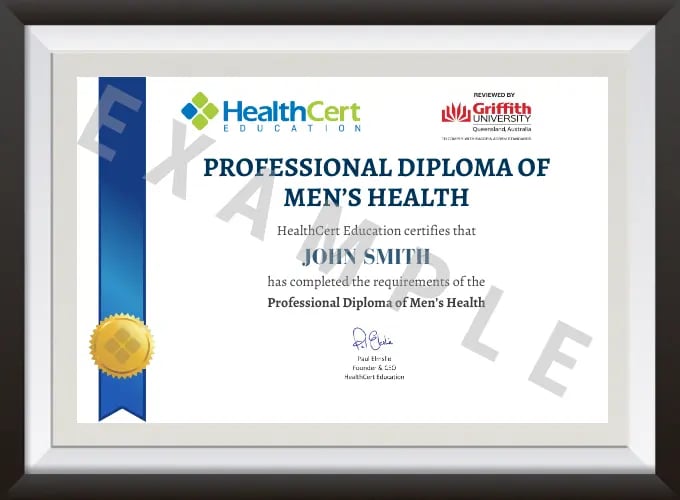Red nodules in children can be deceptively challenging. While many malignant tumours common in...
.jpg?height=200&name=HCE%20HubSpot%20blog%20images%20600x350%20(56).jpg)
Advance your competency and confidence in the management of male health conditions to an accomplished level.

Become a go-to confidant for your male patients by acquiring near-expert knowledge in the management of men's health conditions, including gout, sleep apnoea, musculoskeletal problems, conditions related to smoking, peripheral arterial disease, congestive cardiac failure, HIV, and more.
- This course will advance your confidence and competency in managing men's health presentations.
- Build a better rapport with your male patients to help them manage gender-specific health issues.
- This course is for physicians, nurse practitioners, and degree-qualified nurses.
- CPD-accredited and university-reviewed.
You might also be interested in the Advanced Workshop of Non-Scalpel Vasectomy or the Primary Certificate of Sexual Health for Men.
- Save lives through prevention and early intervention of common male health problems.
- Improve outcomes for patients with congestive cardiac failure, peripheral arterial disease, and gout.
- Effectively manage HIV, sleep apnoea, and recurrent musculoskeletal conditions and sports injuries in men.
- Support your male patients and provide preventive measures for health conditions related to tobacco use.
Get unlimited access to all course content, additional learning materials, ongoing post-course support, and more.
This module is a deep dive into managing patients with HIV, the treatment options, and the comorbidities associated with HIV. Antiretroviral therapy (ART) is recommended for treating HIV infected patients with detectable viremia and treatment options in conjunction with ART are outlined for various conditions. The side effects associated with ART are also discussed. Immune reconstitution inflammatory syndrome (IRIS) is detailed including major and minor criteria, and lists opportunistic infections and neoplasms that fall under IRIS. A comprehensive list of associated diseases of HIV are discussed before moving to inflammatory conditions such as psoriasis, seborrheic dermatitis, papular pruritic eruption and eosinophilic folliculitis. Treatment options are included. Depression is recognized as a major factor leading to poor outcomes among people living with HIV and have a lower uptake and adherence to medical care.
As the pinnacle of men's health training at HealthCert Education, the Professional Diploma of Men's Health goes beyond traditional coursework to deliver a truly immersive, practice-enhancing experience. In addition to course activities, a standout feature of this program is the clinical audit, where participants submit and analyse their own real-world cases — a powerful opportunity to directly apply your learning. This hands-on component, combined with an in-depth literature review of journal articles, ensures participants leave with both academic rigour and practical excellence.

.png?width=143&height=143&name=Joe%20Kosterich%20(3).png)
Dr Kosterich writes for numerous medical and mainstream publications and is a regular on radio and television. He is often called to give opinions in medico legal cases, is clinical editor of Medical Forum Magazine, adjunct professor (teaching) at UWA and a lecturer at Curtin Medical School.
Medical Advisor to Medicinal Cannabis company Little Green Pharma and Chairman of Australian Tobacco Harm Reduction Association, Dr Kosterich has self-published two books: Dr Joe’s DIY Health and 60 Minutes To Better Health, and maintains a website and blog with health information and commentary.
Previously he held senior positions in the Australian Medical Association and sat on numerous industry and government boards. He has extensive corporate experience in the setting up and management of medical centres and in helping businesses maintain a healthy workforce.
Through all this he continues to see patients as a GP each week.

General practitioner
Dr Alice Lam is a general practitioner passionate about evidence-based medicine and education for medical professionals and their patients. She has over 23 years of medical experience in Australia and overseas. Dr Lam graduated from the University of Manchester, UK and practised both as a locum and partner. Since 2008, she has worked as a GP in Melbourne, Australia. Her other interests include digital health, health writing and education for health professionals and patients.


Senior Lecturer, Exercise Physiology, School of Sport and Health Sciences, Cardiff Metropolitan University, Wales
Dr David Pugh is a Senior Lecturer in Exercise Physiology within the School of Sport and Health Sciences at Cardiff Metropolitan University, Wales. His global research agenda focuses on how regular exercise and physical activity can effectively prevent and treat cardiovascular and metabolic diseases across the lifespan.
$1595
Bundle two courses and save 5%, or three courses and save 10% upon enrolment.
Talk to us about deferred payment options, registrar scholarships and special rates.
*For Australian residents only: Online course prices are shown exclusive of GST. If you are GST-registered, please enter a valid ABN at checkout to ensure GST is not applied. Otherwise, 10% GST will be added at checkout. View our FAQ for more information.

Great course! it is very relevant to all practising GPs. Who knew that there is a pathologist "secret". Every GP should know this!
Dr M. Parashar
Highly satisfied. Real patients and cases enhance the learning experience. I will attend the advanced course.
Dr N. Kazi
Don't miss this course! It's interesting, practical and enjoyable. After attending courses for 30 years, I rank this as number one. The course is very useful to all doctors who diagnose and treat skin lesions. Top marks to the organisers.
Dr P. Laundy
Everything was very relevant and easy to understand. Certainly in a very different league to all the other courses I have attended.
Dr M. Kaur
I wish I had completed this course two years ago. My time in general practice so far has not enhanced my diagnostic or surgical skills and I have been scared about skin checks! I actually feel not only confident but empowered. A fantastic course! Thank you!
Dr A. Mooney

HealthCert courses have become the standard by which you gauge all others.
Dr K. Abolarinwa
Good courses with excellent speakers. I particularly enjoyed the case study scenarios which helped to integrate the knowledge gained.
Dr A. Tucker
This is the pathway to improve your confidence and evolve into the GP you aspire to be.
Dr S. Shinwari
| RACGP Activity Number | ACRRM Activity Number | Activity Title | Education Hours | Performance Hours | Outcome Hours | ||
|---|---|---|---|---|---|---|---|
| 442742 | 38231 | Tobacco related conditions | 442742 | 38231 | 4 | 6 | 0 |
| 450710 | 38560 | Gout | 450710 | 38560 | 4.5 | 6 | 0 |
| 448717 | 38551 | Recurrent musculoskeletal and sports injuries in men | 448717 | 38551 | 5 | 6 | 0 |
| 441329 | 38220 | Congestive cardiac failure | 441329 | 38220 | 4.5 | 6 | 0 |
| 822010 | 38487 | Obstructive sleep apnoea | 822010 | 38487 | 4.5 | 6 | 0 |
| 822041 | 38490 | Managing male patients with HIV | 822041 | 38490 | 4 | 6 | 0 |
| 822022 | 38489 | Peripheral arterial disease | 822022 | 38489 | 4 | 6 | 0 |
| 822048 | 38491 | Men’s cases: Smoking, gout, PVD and CCF | 822048 | 38491 | 4.5 | 6 | 0 |
| 765067 | 38415 | Clinical Audit of Men’s Health: Prostate conditions | 765067 | 38415 | 0 | 2 | 19.5 |
| 765071 | 38424 | Clinical Audit of Men’s Health: Wellbeing and lifestyle choices | 765071 | 38424 | 0 | 2 | 19.5 |
| Total hours | 35 | 52 | 39 | ||||
View the CPD Hours for all HealthCert Education activities.
The comprehensive, peer-reviewed clinical audit associated with this Professional Diploma exceeds the minimum annual CPD outcome measurement hours.
The Professional Diploma of Men's Health is for physicians, nurse practitioners, and degree-qualified nurses. The prerequisite for this Professional Diploma course is the successful completion of the HealthCert Advanced Certificate of Men’s Health (or a qualification deemed equivalent) and HealthCert also highly recommends successful management of at least 30 cases of men’s health issues prior to enrolment.
Participants do not have to pass an IELTS test but, as the courses are delivered in English, proficiency in listening, reading and writing English is assumed.
Participants will require access to a computer/laptop, an internet connection and a basic level of technology proficiency to access and navigate the online learning portal.
This certificate course meets the minimum 50 hours CPD annual requirement across all three mandatory CPD activity types.
Upon successful completion of the course requirements, course participants will receive the Professional Diploma
This certificate course:
To learn more about the delivery of certificates in Australia and overseas, please visit our FAQs.
Men's Health Pathway
This course is the final stage of the three-part men's health pathway. The full pathway is Professional Certificate of Men's Health, Advanced Certificate Men's Health, and Professional Diploma of Men's Health.
You might also be interested in HealthCert's Advanced Workshop of Non-Scalpel Vasectomy or the Primary Certificate of Sexual Health for Men.
This organisation is an RACGP-accredited CPD provider under the RACGP CPD Program.




Don't see your question? Explore other faqs or talk to us.
Fees will vary based on the program and study option selected (fully online vs online + optional practical workshop). Payments can be made upfront or in monthly instalments. Special rates and various payment options are available. GP registrars and doctors in training enjoy a scholarship of up to $500. Talk to us to learn more.
Completion of any HealthCert course or attendance at an event will enable you to access the HealthCert Alumni Program which includes:
HealthCert Education is pleased to issue digital credentials for alumni. Digital credentials are a permanent online record of your successful completion of a HealthCert course and are issued to all course participants in addition to PDF certificates. If you are based in Australia, you also have the option to order a hard copy of your digital certificate for a small additional fee.
The recommended study duration of this certificate course is 104 hours, which includes study of the pre-course activities and readings, online lectures, live tutorials, and online assessment. This self-paced course offers the flexibility of 100% online study in your own time, at your own pace, in your own home or office, with no mandatory face-to-face requirements. You are not required to be online at specific times but can view and replay video lectures at your convenience.
All HealthCert courses meet World Federation of Medical Education standards. This certificate course qualifies for CPD hours from the Royal Australian College of General Practitioners (RACGP) and the Australian College of Rural and Remote Medicine (ACRRM) in Australia. It is recognised by the Royal New Zealand College of General Practitioners (RNZCGP) in New Zealand. It is recognised by the Hong Kong College of Family Physicians (HKCFP) in China. It is a self-submitted activity in Dubai and the United Kingdom. It is a self-submitted activity through the College of Family Physicians in Canada. If you live or work outside one of the above-mentioned countries, please contact us on admin@healthcert.com to discuss whether this course can be recognised in your country.
Want to stay up-to-date with the latest case studies, podcasts, free video tutorials and medical research articles pertinent to primary care?
Our Education Advisors can assist you with any queries and tailor our education pathway to suit your current expertise, interests and career goals.